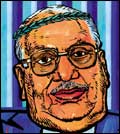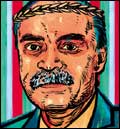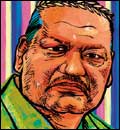 |
 |
K. ANJI REDDY
CHAIRMAN, DR REDDY' LAB
Increase in market capitalisation (FY 02 over FY 01): 84.05%
Increase in salary (FY 02 over FY 01): 189.82% |
B.M. MUNJAL
CHAIRMAN, HERO HONDA MOTORS
Increase in market capitalisation (FY 02 over FY 01): 21.37%
Increase in salary (FY 02 over FY 01): 84.75% |
 |
 |
M.S. BANGA
CHAIRMAN & MD, HLL
Increase in market capitalisation (FY 02 over FY 01): -3.93.05%
Increase in salary (FY 02 over FY 01): 72.91% |
ANIL AGARWAL
CHAIRMAN,
STERLITE IND
Increase in market capitalisation (FY 02 over FY 01): -75.05%
Increase in salary (FY 02 over FY 01): 10.91% |
Dear Tarun,
I sell manure. Actually, I head the sales
function at a large fertiliser company, but given my predicament,
selling manure is probably a better description of how I feel. Last
week I had a meeting with my CEO to review my performance and discuss
my compensation for the following year. I had done well, he admitted,
but given the state of the economy, he couldn't, or rather, the
company couldn't afford to reward me with a significant increment.
My CEO is a good salesman and by the time I left his room I was
convinced that even the single-digit increment he was putting me
down for was generous-after all, the company's market capitalisation
was down 20 per cent. Yesterday, I was mentioning the same to an
old friend who heads the hr department-we go way back and meet for
the occasional drink out of work-and he couldn't stop laughing.
He claims the CEO has put himself down for a 75 per cent raise.
And his salary is already two-and-a-half times mine. Over the past
five years, a significant chunk of my compensation package has been
made variable. Surely, this move towards performance-pay must apply
to the CEO too? Tell me, am I a minority of one working for a self-centred
CEO, or do other employees in other organisations have similar problems?
It
doesn't take an agony aunt (or uncle) to answer that. A cursory
examination of the figures accompanying the visages occupying the
bottom half of the opposite page should do. The two men on top did
alright-both Doctor Reddy's Laboratories and Hero Honda Motors saw
their average market capitalisation in 2001-02 zoom and their CEOs
rewarding themselves (even disproportionately) is condonable, if
not reasonable. As for HLL's M.S. Banga and Sterlite's Agarwal,
well, we'll let the numbers do the talking.
These figures were culled out from annual reports
for the year 2001-02 and 2000-01. And going by the findings of the
BT-Omam CEO Salary Survey, 2003, things are no different this year.
The survey, of 73 companies, across 14 sectors puts average CEO
pay at Rs 1.55 crore, well above the magical Rs 1-crore figure that
was once considered a semi-permeable-only the best broke through
it-ceiling for Indian executives. Not too long ago, the fast moving
consumer goods sector was the best place to be for money-minded
CEOs; today, every sector, from auto to consumer durables to technology
to older-than-old-economy diversified has a eight digit number flashing
next to the CEOs name. P. Dwarkanath, the head of hr at SmithKline
Beecham Consumer Healthcare thinks these numbers are only to be
expected (and nothing out of the ordinary). "Indian companies
are realising the need to benchmark carefully and give their CEOs
a competitive salary." A survey of 36 Indian companies by consulting
firm Mercer reveals an obsession with outpaying the market: 11 per
cent of the respondents claimed to be benchmarking with the 90th
percentile-they were consciously paying more than 90 per cent of
the companies in their universe-and 50 per cent, with the 75th.
Still, the Mercer sample may have been skewed towards large companies.
The range of salaries emerging from the BT-Omam survey is staggering:
a maximum of Rs 5.16 crore and a minimum of Rs 39.24 lakh. Some
rich, some poor.
Do They Deserve It?
No one-apart from a few of us conservatives-seems
to mind the huge pay cheques CEOs take home. "Everything revolves
around CEOs," says R. Suresh, CEO of head-hunting firm Stanton
Chase, "Companies realise this and are willing to pay a price
for good leadership." The fact that new-age businesses such
as telecom, business process outsourcing, and (organised) retail
have taken off in India has helped. As has the change of guard-the
young replacing the old-in hoary business houses such as the Tata
Group and the A.V. Birla one. Compensation experts-business couldn't
be better for them-see no immediate end to the trend of rising CEO
salaries.
Cerebrus Consultants projects a conservative
6-7 per cent rise in 2003-04; Mercer, 9.09 per cent; Hewitt, 11
per cent; and Watson Wyatt, 15 per cent. "There never really
was a blip in the CEO market," says Preety Kumar, Senior Partner,
Amrop International, an executive search firm. Nor will there be
one. "Companies are aware that good CEOs expect good prices."
The fairness of it all-in the light of Bernie
Ebbers, Gary Winnick, Dennis Kozlowski, and others of the ilk-may
be a hot subject in USA Inc. In India, although noises about this
are heard from time to time, no one really seems to mind.
As for the CEOs themselves they believe what
they earn is justified by what they do. "The CEO's role is
getting more and more complex," explains K. Muralidhara, Country
Manager, American Express TRS. "I think they (we) deserve what
they (we) earn." "These days you have more challenges,"
adds Rana Kapoor, CEO, Rabo Bank. "A company needs sound leadership
to grow the topline and, by and large, most companies are getting
a good deal." Don't blame the CEO, seems to be the refrain
among the genus. "A CEO performs for three years and takes
a good hike when the market is down," says David Robinson,
CEO, Ernst & Young Global Employment Solutions. "We see
the big payout and not the long-term growth he has facilitated."
Indeed, most Indian CEOs and CEO-pay watchers
are willing to go far enough to say that the Indian CEO, with his
eight-figure salary and his S-320 Mercedes, needs to be pitied,
not envied. Reason? They earn far less than their global counterparts.
"An Indian CEO earns just about 50 per cent of what his counterpart
in the Asia Pacific region does," says Sridhar Ganesan, a consultant
with Watson Wyatt. Ganesan is right: even the Rs 9.85 crore Doctor
Reddy's Anji Reddy earned in 2001-02 translates into less than $2
million. In 2001, Oracle CEO Larry Ellison cashed in $706.1 million
worth of options; and according to a survey carried out by the Investor
Responsibility Research Centre for USA Today, the overall compensation
of American CEOs rose 24 per cent in 2001 to a median of $10.2 million.
This, at a time when the Standard & Poor's 500 stock index fell
13 per cent.
So, can we expect to see nine figure averages
in next year's edition of the BT-Omam exercise? Not really, says
Anita Ramachandran, CEO, Cerebrus Consultants. "Salary rises
in India are finally getting a connect to the size of the business
and profits; the business has to be able to bear the cost of the
CEO." We're relieved.
DANCING FOR DINNER
Increasingly, performance is boosting or
breaking CEO pay. |
| A cursory study
of Wipro's annual reports of the past two years shows that Chairman
Azim Premji earned Rs 1.69 crore in 2001-02, down 61 per cent
from the Rs 4.29 crore he earned in 2001-02. The reason? His
performance bonus fell from Rs 3.16 crore to Rs 97.17 lakh.
"People with a high performance pay component in their
salaries are vulnerable," says Anita Ramachandran, a Mumbai-based
hr and compensation consultant. Hughes Software CEO Arun Kumar
will agree. His salary declined 12.9 per cent in 2001-02. "Variable
pay may account for as much as 50 per cent of top management's
salary," says Vivek Srivastava, a manager at Mercer.
At the CEO-level, variable pay isn't just about performance
bonuses. It is also about cash incentives and stock options.
The global meltdown hasn't diminished the lustre of stock
options. "CEOs believe they can make a difference and
want a share of the company's success," says Atul Vohra,
a partner at Heidrick and Struggles. But how are CEOs judged?
By a combination of financial and non-financial metrics usually,
although a Mercer study of 36 Indian companies found that
in 32 per cent of cases, CEOs were judged by financial results
alone. "In the end," says Vohra, "the buck
stops with the CEO."
|
STRETCHING THE NUMBERS...
... and the imagination: Reported figures
of CEO pay may often be conservative |
| Companies calculate
CEO salaries by the book. In strict adherence to tax laws the
value of perquisites such as housing and cars is done at a mandated
percentage of their salary-10 per cent in the case of housing,
for instance.
Then, there's the tissue contract. After negotiating his
formal contract, a CEO sits down to negotiate his tissue contract.
This is usually verbal in nature, although the chairman of
the recruiting committee does jot down everything on a tissue
in some cases (hence the name). A tissue contract could include
paying for a daughter's education at Harvard, a paid holiday
for the family... anything.
Housing is a grey-area. CEOs often request their companies
to buy a house for them on the tacit understanding that they
will, in turn, buy it at the depreciated price when they leave.
And some multinationals get the parent to pay a consulting
fee to the CEO. The number doesn't get reflected in the company's
financials and everyone is happy. Bottomline: as one consultant
puts it, "in some cases, a CEO's actual salary could
be 40 per cent higher than the reported one."
|
|

